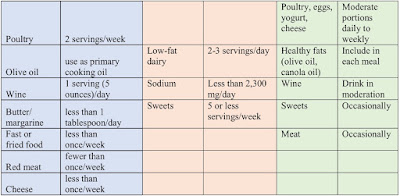 |
| followgreenliving.com |
The MIND (Mediterranean-DASH Intervention for Neurodegenerative Delay) diet has received much attention over the last few years for the claim that it may reduce a person’s risk of developing dementia. The MIND diet was developed by a team of Rush University researchers, which combines many of the components of the traditional Greek Mediterranean diet and the Dietary Approach to Stop Hypertension (DASH) diet. Both diets (Mediterranean and DASH) have been well researched and found to have a beneficial effect on reducing the risk of developing cardiovascular and hypertension disorders. However, only recently has research focused on the cognitive effects of either diet. A team of researchers explored the relationship of the DASH and Mediterranean - like diets and cognitive decline in a large sample of elderly adults. Their results showed both diets were associated with rates of cognitive decline. Researchers conducted a meta-analysis to determine if a relationship existed between adherence to a Mediterranean diet and cognitive disorders and found an approximately linear relationship between the two.
The team who developed the MIND diet, conducted a study examining three dietary patterns, MIND diet, DASH diet, and traditional Greek Mediterranean diet, in relation to Alzheimer’s disease. Researches assessed the diets of 923 participants, ages 58-98 years. The results of this study showed, with a high adherence level all three dietary patterns were associated with a reduced incidence of Alzheimer’s disease, and a moderate adherence to the MIND diet was also associated with a reduced incidence of Alzheimer’s disease.
The 15 MIND diet foods consisted of 10 brain healthy food groups (green leafy vegetables, other vegetables, nuts, berries, beans, whole grains, fish, poultry, olive oil and wine) and 5 unhealthy food groups (red meats, butter and stick margarine, cheese, pastries and sweets, and fast/fried foods). The MIND Diet emphasizes daily intake of leafy green vegetables along with other vegetables and berries exclusively to other fruits. The DASH and Mediterranean diets recommend daily intake of fruit and vegetables. The MIND diet also recommends fewer daily servings of whole grains and weekly servings of fish compared to the other two diets.
Below is a table listing the recommendations of each diet.
While current research evaluating the effects of nutrition on cognition is promising, most of the studies are based on observational research and lack causal evidence. Previous research indicates body mass index (BMI) is associated with risk of dementia. Higher midlife BMI has been associated with a 75% increase in risk for developing Alzheimer’s disease. Some research suggests chronic co-morbidities (arthritis, atherosclerosis, obesity, diabetes) and acute systemic inflammation contribute to the progression of dementia. Research has also shown malnutrition has a significant effect on cognitive decline. The well balanced and healthy nature of all three of these diets may contribute to reducing chronic comorbidities and systemic inflammation. Continued research is needed to explore the causal relationship between nutrition and cognition. Currently, a 3-year research study is underway which will examine diet and brain health, comparing two parallel groups with two different mild calorie restricted diets
So, what does this all mean? While, research is ongoing to determine the exact mechanisms and effectiveness of nutrition and prevention of cognitive decline, the benefits of following a healthy well-balanced diet are plentiful. Choosing any of the three dietary patterns mentioned, (MIND, DASH or Mediterranean style) can help reduce the risk of chronic diseases and may even reduce the risk of cognitive decline. There are many resources available online and in book stores for recipes and tips on how to incorporate these dietary patterns into our everyday lives. Smartphone and tablet applications are also available for each of diets mentioned, for both Android and Apple devices.
References available upon request.
Cara Miller
Dietetic Intern



No comments:
Post a Comment